Related Research Articles

Lynn Rene Anderson, was an American country singer and television personality. Her signature recording crossover hit, "Rose Garden," was a number one hit in the United States and internationally. She had five number one and 18 Top-10 hit singles on the Billboard country songs chart. Anderson is regarded as one of country music's most significant performers.
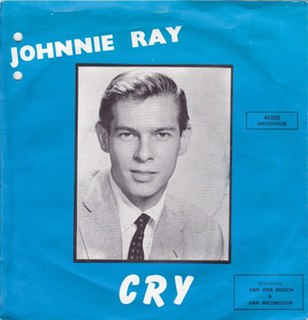
"Cry" is a 1951 popular song written by Churchill Kohlman. The song was first recorded by Ruth Casey on the Cadillac label. The biggest hit version was recorded in New York City by Johnnie Ray and The Four Lads on October 16, 1951. Singer Ronnie Dove also had a big hit with the song in 1966.
"If I Kiss You " is a popular 1967 song by country singer Lynn Anderson.

"Big Girls Don't Cry" is a song recorded by American singer Fergie for her debut studio album, The Dutchess (2006). It was written by Fergie and Toby Gad while the production was helmed by will.i.am. The song was released as the fourth single from the album on May 22, 2007. "Big Girls Don't Cry" deviates from the hip hop and urban music of Fergie's previous singles and opts for a more simplistic pop ballad sound that incorporates acoustic elements. It features credits from about thirty instrumentalists, many of which play the violins, violas and celli on the track. Lyrically, the song talks about moving on from the pain of a breakup.
"Rose Garden" is a song written in 1967 by American singer-songwriter Joe South. It was first recorded by Billy Joe Royal on his 1967 studio album Billy Joe Royal Featuring "Hush". Versions by South himself and Dobie Gray appeared shortly after the original. Gray's version became a minor hit in North America in 1969.
"Fool Me" is a song written by Joe South. South's version was released as a single in 1971 and peaked at number 78 on the Billboard Hot 100.
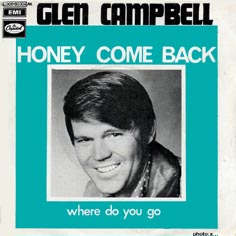
"Honey Come Back" is a song written by Jimmy Webb, and recorded by the American country music artist Glen Campbell. It was released in January 1970 as the second single from his album Try a Little Kindness. The song peaked at number 2 on the Billboard Hot Country Singles chart. It also reached number 1 on the RPM Country Tracks chart in Canada.
"Mother, May I" is a song written and recorded by American country music artists Liz Anderson and Lynn Anderson. The song was recorded as a duet between mother and daughter. It was released as a single in 1968 via RCA Records.

American country artist Loretta Lynn has released 86 singles, two B-sides and 14 music videos. Her debut single was "I'm a Honky Tonk Girl" (1960) via Zero Records. Promoting the song with her husband by driving to each radio station, the effort paid off when it peaked at number fourteen on the Billboard Hot Country Songs chart. Arriving in Nashville, Tennessee, that year, she signed a recording contract with Decca Records. In 1962, "Success" reached the sixth position on the country songs chart, starting a series of top ten hits including "Wine Women and Song" and "Blue Kentucky Girl". She began collaborating with Ernest Tubb in 1964 and recorded four hit singles with him, including "Mr. and Mrs. Used to Be". Lynn's popularity greatly increased in 1966 when she began releasing her own compositions as singles. Among the first was "You Ain't Woman Enough " which reached the second position on the country songs list. She then reached the number one spot with "Don't Come Home A-Drinkin' " (1967). This was followed by "Fist City" (1968) and "Woman of the World " (1969).
"That's a No No" is a song written by Ben Peters. It was recorded by American country music artist Lynn Anderson and released as a single in July 1969 via Chart Records.
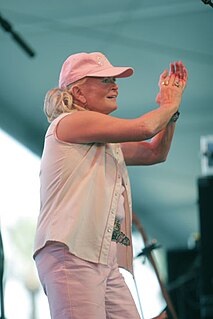
The singles discography of American country music artist Lynn Anderson contains 72 singles, three promotional singles, one charting B-side, two music videos and nine other song appearances. She signed her first recording contract with Chart Records in 1966. The following year, her single "Ride, Ride, Ride" debuted on the Billboard Hot Country Singles chart. Also in 1967, her single "If I Kiss You " became her first major hit when it reached number five on the country singles chart. Anderson had a series of hits that reached the top ten and 20 during the 1960s including "Promises, Promises" (1969), "No Another Time" (1968), "Big Girls Don't Cry" (1968) and "That's a No No" (1969).
"Flattery Will You Get You Everywhere" is a song written by Liz Anderson that was recorded by American country music artist Lynn Anderson. It was released as a single in October 1968 via Chart Records.
"Our House Is Not a Home " is a song written by Shirley Mayo and Curly Putman. It was recorded by American country music artist Lynn Anderson and released as a single in February 1969 via Chart Records.
"All the King's Horses" is a song written by Johnny Cunningham. It was recorded by American country music artist Lynn Anderson and released as a single in January 1976 via Columbia Records.

Big Girls Don't Cry is a studio album by American country music artist Lynn Anderson. It was released in July 1968 via Chart Records and was produced by Slim Williamson. The record was Anderson's third studio recording issued during her career and contained a total of 12 tracks. The title track was spawned as a single from the project and became a major hit on the country charts. The album itself would also reach peak positions on music publication charts.
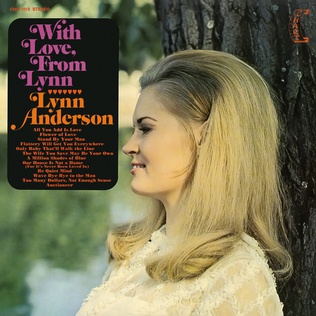
With Love, from Lynn is a studio album released by American country artist Lynn Anderson. It was released in March 1969 via Chart Records and was produced by Slim Williamson. Her fourth studio release, With Love from Lynn contained 12 tracks. Two of these tracks were singles that became major hits for Anderson between 1968 and 1969. The album itself was successful after charting on the Billboard country albums survey.

Uptown Country Girl is a studio album by American country artist Lynn Anderson. It was released in February 1970 on Chart Records and was produced by Slim Williamson. It was Anderson's seventh studio release in her recording career and contained a total of ten tracks. Two tracks were released as singles. Both "He'd Still Love Me" and "I've Been Everywhere" became major hits on the Billboard country chart between 1969 and 1970.

I'm Alright is a studio album by American country artist Lynn Anderson. It was released in September 1970 on Chart Records and was produced by Slim Williamson. I'm Alright was Anderson's tenth studio recording and her final studio release for the Chart label. It included two singles that became major radio hits in 1970. Both "Rocky Top" and the title track reached the Billboard country charts that year.
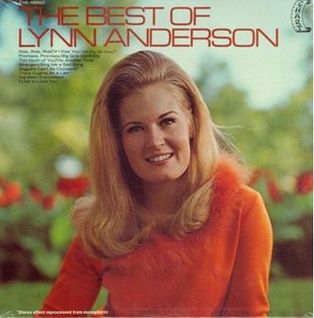
The Best of Lynn Anderson is a compilation album by American country artist Lynn Anderson. It was released in December 1968 via Chart Records and was produced by Slim Williamson. It was the first compilation released in Anderson's music career and the first of several to be released on the Chart label. The album featured her most popular recordings occurring in the first several years of her music career. Twelve tracks were included on the album release.
"Even Cowgirls Get the Blues" is a song written by Rodney Crowell. It has since been covered by several artists, notably La Costa, Emmylou Harris and Lynn Anderson. Crowell claims to have written "Even Cowgirls Get The Blues" about Harris and her pal Susanna Clark. The title of the song is taken from the then-popular novel of the same name by author Tom Robbins. The song has been released as a single twice and has also has appeared on albums of various artists.
References
- ↑ "Lynn Anderson singles". Allmusic . Retrieved 30 March 2011.
- ↑ "RPM Country Singles for October 21, 1968". RPM . Archived from the original on 22 October 2012. Retrieved 30 March 2011.